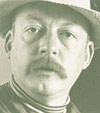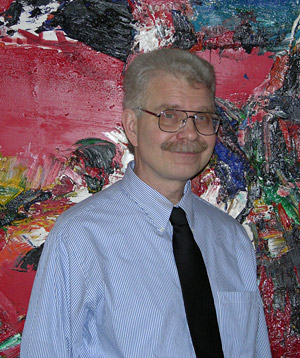
| Jacket 38 — Late 2009 | Jacket 38 Contents page | Jacket Homepage | Search Jacket |

This piece is about 4 printed pages long.
It is copyright © Michael Basinski and Jacket magazine 2009. See our [»»] Copyright notice.
The Internet address of this page is http://jacketmagazine.com/38/jwd04-basinski.shtml
Back to the Jonathan Williams Contents list
1
The Poetry Collection is more than seventy years old. Our collecting policy of harvesting as much published poetry without bias from all corners of the English speaking world has resulted in an unmatched first edition and little magazine collection with more than 140 thousand titles. The Poetry Collection is 20th century poetry’s library of record. However, the Collection is much more than books and magazines. It boasts more than 150 manuscript collections. The collecting of manuscripts began in the late 1930s when Charles Abbott asked poets for donations of their work sheets, which were at that time simply food for the furnace. Because of Abbott’s ability to see the future of scholarship, the Poetry Collection acquired the manuscripts of William Carlos Williams, Wyndham Lewis and James Joyce and the Collection holds more than 400 Ezra Pound letters and, for example, Wallace Stevens’s manuscript of The Man and the Blue Guitar. Obviously, the Collection’s collecting line began with the Modernists. With this established tradition, manuscript collecting extended to the New American Poetry and a remarkable facet of that poetry were the poets associated with Black Mountain College. Central to the Black Mountain constellation of poets was Jonathan Williams and his Jargon Society, an independent publishing venture that made the names of Charles Olson, Robert Creeley, Joel Oppenheimer, Denise Levertov and Robert Duncan, among others, common names in the halls and homes of the poem. The Jargon Society Collection and the manuscripts of Jonathan Williams reside in The Poetry Collection.
2
The Jargon Society Collection is the largest single manuscript Collection held in the Poetry Collection. As such, it is composed of more than 750 archival (clam-shell) boxes and more than fifty storage boxes of partially sorted archival material, which translates into more than 300 plus linear feet of manuscript material. Purchased in 1991, the Jargon collection is arranged in seven series: Series I. Manuscripts – Jonathan Williams (22 boxes alphabetized) — Series II. Manuscripts – Other (59 boxes alphabetized) — Series III. Business records (17 boxes) — Series IV. Letters to Jonathan Williams (487 boxes alphabetized) — Series V. Letters from Jonathan Williams (13 boxes alphabetized) — Series VI. Art and photographs (51 boxes) — Series VII. Peripherals (64 boxes). The peripheral material includes posters, invitations to art openings and musical performances, random notes, random mailings, and all variety and sorts of miscellaneous material that offers context to the other specific archival material. Projects are currently underway to bring all of this material into full view. Do not hesitate to contact the Poetry Collection with your interests.
3
A quick review of Jargon authors teases the scholarly imagination. The archive includes research material relative to the study of: Charles Olson, Robert Duncan, Irving Layton, Kenneth Patchen, Ian Hamilton Finlay, Robert Creeley, Denise Levertov, Loraine Niedecker, Louis Zukofsky, Ronald Johnson, William Carlos Williams, Joe Oppenheimer, Basil Bunting, Tom Meyer, and then there are the Jargon visual artists, e.g., R. B. Kitaj and then there are the Jargon photographers, e.g., Eugene Meatyard, and etc. etc. The Collection is a treasure of research projects awaiting the 21st century scholar.
4
The Jargon Society would not exist at all were it not for Jonathan Williams. Born in Asheville, North Carolina in 1929, Jonathan Williams was a poet, photographer, essayist and publisher. His highly regarded and eclectic Jargon Society Started in 1951, the same year Williams became a student at Black Mountain College, and he, via the Jargon Society, remained actively engaged in the publication of books for over fifty years, which is to say the entire span of Jonathan Williams’s adult artistic life. This monument should not overshadow Jonathan Williams the poet.
5
Williams was a poet that explored form and tone and temperament and all of form’s potential, to which he brought his wealth of tone and personal temperament. Perhaps more than other poets from the Black Mountain tradition, Williams remained open to a poem that could contain the multitudes and the entire range of human experience. His artistic life was a collage and so was his poetry. It is, therefore, easy to define Jonathan Williams as a poet. But to say what type of poet demands a neologism for a concrete, sound, field, Black Mountain, collage, humorous, Gay, Southern, progressive, Appalachian and experimental poet and perhaps a few other isms and this and that and bricka brack to top off the JW poetic stew. A full, focused and scrutinizing study of the poetry of Jonathan Williams from his Mahler to his use of the aphorism and beyond is much desired and needed and would open an understanding of the complexity of the Jargon Society as an extension of Jonathan’s poetry.
6
I had occasion to meet Jonathan Williams several times at the Poetry Collection. One might say, easily, that these were business meetings and, therefore, tense and anxious because they revolved around that decidedly unpoetic substance labeled money. Nevertheless, money and its softer terminology: funding and/or financial support was a necessity for Jonathan who worked with poetry outside of the academy. Somehow I found myself as a liaison between the University and the realm of poetry as manifested through JW. Over the years there were many phone calls. Jonathan’s home needed a new roof or he needed photocopies of his Bunting letters or an installment check went astray. In fact, there was another Jonathan Williams who, at least once, received a check meant for our JW. We talked about the weather and he was always interested in our snow storms and we talked about sports. He knew all about the Buffalo Bills. He faithfully watched the Atlanta Braves on TV. He kept track of the Tour de France. I learned about drought and frost and ice storms in North Carolina.
7
I do remember his first walking into the Poetry Collection. It was history that moved into the room. He was not as tall as Charles Olson but taller than most people and imposing and commanding and with a deep aged and refined voice. Tom Meyer was his companion. The more I remember the more links appear in mind, like Wendy Kramer’s project linking Jonathan’s approach to poetry with that of Gertrude Stein’s and when we were all sorting Jonathan’s manuscripts, there was a poem with lines about a pan cake and Pan’s cock.
8
I have decided that my foremost JW memory would involve Jonathan at a certain cocktail party. It was the celebration of the fortieth anniversary of the Jargon society, I think. The Jargon Board of Directors was in Buffalo at the Poetry Collection as were the Directors or the University of Buffalo Foundation. I recall Jonathan Williams, always the connoisseur, talking with Alice Wardynski. The conversation was about kielbasa (Polish sausage for you outsiders). Alice Wardynski’s father began a flourishing Buffalo business making sausages and cold-cuts (Don’t give me that Baloney! I want Wardynski’s! was their jingle.) and Alice Wardynski was much involved in the family business. Jonathan quizzed her about the perfect preparation of both smoked and fresh Polish sausage, about the exact time sausage should boil, about the exact amount of salt one might pinch into the water.

Michael Basinski
Michael Basinski is The Curator of The Poetry Collection, the University at Buffalo. He performs his work as a solo poet and in ensemble with BuffFluxus. Among his many books of poetry are Of Venus 93 (Little Scratch Pad); All My Eggs Are Broken (BlazeVox); Heka (Factory School); Strange Things Begin to Happen When a Meteor Crashes in the Arizona Desert (Burning Press); The Idyllic Book (Michel Letko, Houston, Texas); Mool, Mool3Ghosts and Shards of Shampoo (Bob Cobbing’s Writers Forum); Cnyttan and Heebie-Jeebies (Meow Press); By and The Doors (House Press); Un-Nome, Red Rain Two, Abzu and Flight to the Moon (Run Away Spoon Press): Poemeserss (Structum Press) and many more. See (or hear): RadioRadio on UBUWEB (see Basinski and BuffFluxus) etc. His poems and other works have appeared in Dandelion, BoxKite, Antennae, Unbearables Magazine, Open Letter, Torgue, Leopold Bloom, Wooden Head Review, Basta, Kiosk, Explosive Magazine, Deluxe Rubber Chicken, First Offense, Terrible Work, Juxta, Kenning, Witz, Lungfull, Lvng, Generator, Tinfish, Curicule Patterns, Score, Unarmed, Rampike, First Intensity, House Organ, Ferrum Wheel, End Note, Ur Vox, Damn the Caesars, Pilot, 1913, Filling Station, Public Illumination, Poetry, and in many others.